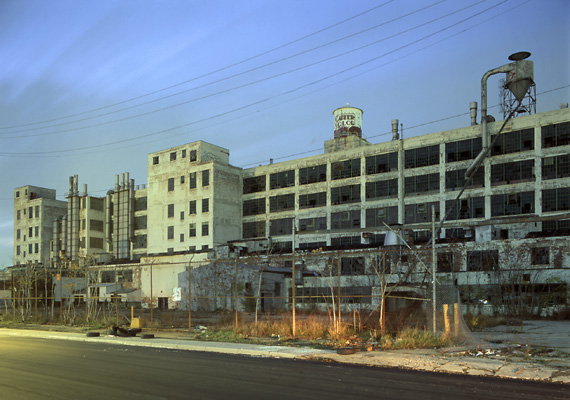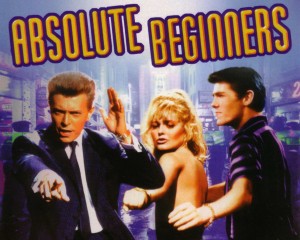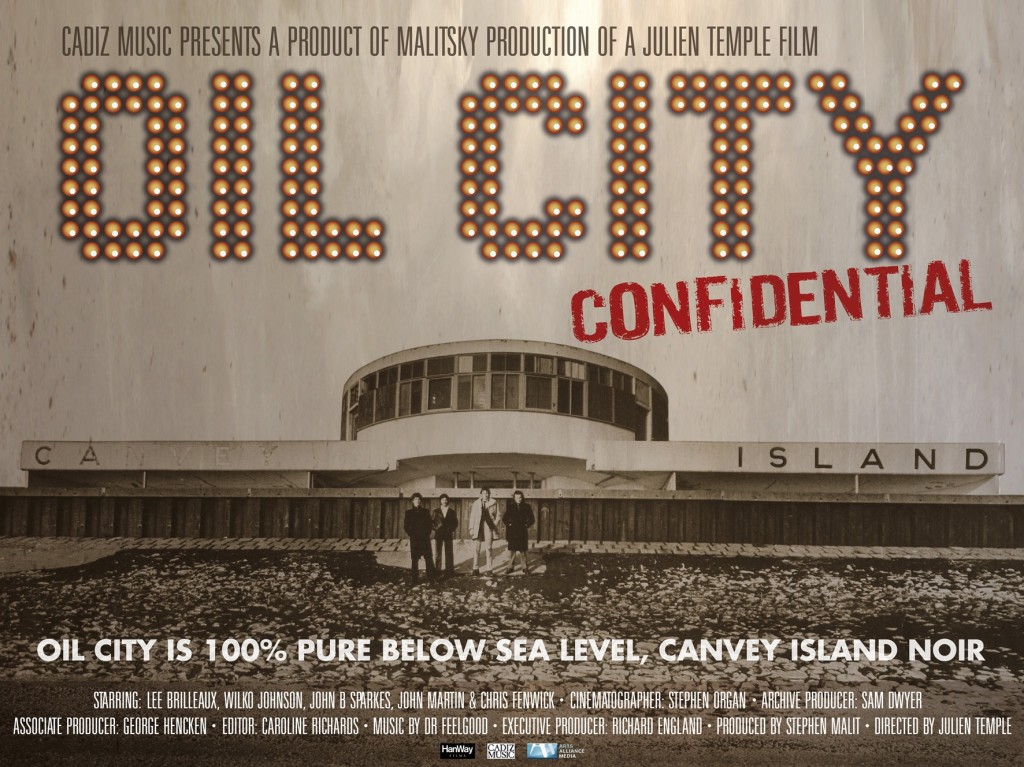



Amazingly connected with Detroit’s reality, fascinated by that city, once upon a time the cradle of the American Dream, collapsed and destroyed from a post-industrial city into a location where unhabited palaces, burnt factories and violence are the kings of that kingdom of disillusion, Julien Temple, the myth in connection between cinema and music, is proud to present at Turin Film Festival 2010 his new documentary about Detroit, “¿Requiem For Detroit?”, and to receive the award he won last year for his music-mentary about Dr.Feelgood’s story, “Oil City Confdential”.
After a long walk, in Turin by night, under the snow and alone, he felt in love with that city, and in this interview revealed to me his ideas on politics to preserve art and, so, cities, Joe Strummer’s special friendship, working with great musicians like Bowie, and the passion for cinema, from documentary to fiction.
– “¿Requiem For Detroit?”: how were you inspired in that kind of project about Detroit? And why that question marks in the title, maybe you wanted to leave a sense of hope for the city’s resurrection?
JT: Of course I did. They put the doubt, even from the title, if Detroit can be considered, or not, dead, and the American Dream connected with it, too. It’s an end but not the end! Also the word “requiem” is the music key I put in the film for the same meaning.
I started to get in touch with Detroit from its music, for the car industries and from some friends of mine living there; I had been in Detroit so many times before starting working at the documentary, but I’d never lived it as it should be done.
The only place I remember about my past journeys was its airport: the typical american one, but when I thought at the idea of filming a doumentary about the today reality there, I had to travel and live there more.
It’s incredibile how a city can pefectly describe its society: in Detroit the so many palaces abandoned are the symbol of the dacay of the american society, one time concentrated on the industrialization and today fallen from the myth of basing evolution from that kind of point and not thinking about the civilization and culture.
No one can really understand how it’s devasted, full of violence and degradation, but when you get in touch with a city like that you sadly understand that the same civilization you live in is the one that has made that city so collapsed.
It’s of course the failure of the American Dream: in deroit was invented the elevator, the highways, the malls: we are now over the American Dream itself, and it must not be considered only a failure, but a new way of born again.
– How have you worked in Detroit with the people from here, for filming?
JT: I found lots of hope in people, luckily. We were about 10 days there filming so we’ve shot all day and all night. We did not know how the movie would be in the end, it’s very spontaneous, made with a very small crew (about 5 people). We found that in the middle of this ruins there are lots of people full of energy, mostly the younger and the artists, who want to live in a different style and organize themselves with different attitudes from the past. This reminds me the same situation there was in the East Village in NY in the early ‘70s, a great place for the artists to develop their talent from the ashes.

– Violence and decay of a city: the example of Detroit and the comparison with other countries’ cities.
JT: Unfortunately the example of Detroit is maybe only the best known, but there are, all over the world, so many other small or big cities like it.
Cities where a bad political idea had given or is given the place a worst future.
I’m thinking, for example, to a small city in the Somerset, in UK, Bridgwater: it’s unbelievable how in an area so pretty and rich, can still live a small city like that, with factories closing, people unemployed, desolation, criminality and violence. It’s the typical collapse of a post-industrial city, vitiated by the recent financial crisis.
And, I must say, if the governments do not improve culture and civilization in the whole world, we will turn easily into this reality in each country.
– Music: I have to ask you! You’ve directed so many historic bands, especially in the ‘80s, from Bowie do Depeche Mode, Judas Priest, Duran Duran, Tom Petty, Sex Pistols and Neil Young. What about working with them?
JT: Every artist I’ve worked with is different from the other, from their own personality to their art.
I have to say that not always I’ve worked with artists I admire as musicians, but the way I’ve always worked with them born from my attention in trying to find their art behind the appearance. I think it’s important to make people know, from a videoclip, what was the aim of the song and the essence of the music of that kind of artist in particular, first of all, so I’ve always studied a lot and listened to all their songs before working with them.
As a director I have to find a visual and intellectal approach to the artist, and this is even more important, sometimes, for the people to understand what’s behind the lyrics of a single song.
And also, the different artists have different way of working.
David Bowie has always been a perfect worker in everything he has done: directing him is dificult because you are in touch with a so talented and brilliant artist, but also it’s so simple, because he’s able to do everything, not only perfectly singing and writing. He’s always been very serious and timely in filming sessions, because he understands that it’s a work involving lots of people, and that it’s the perfect way to convey his art. I think that every artist should learn from his behavior!
I remember working with some other artists, sometimes very young, and not so sure about the fact that they’ll become so famous in the future.
It’s amazing: you can meet very different men and artists, that you can be surprised every day, even after so many years of carreer.

– “Joe Strummer: The Future Is Unwritten”, about Joe Strummer: what about the idea of a documentary on him, finding the footages and collecting the interviews with famous artists of today about the Clash’s leader? And, of course, your personal idea of him, as a man and as an artist…
JT: Joe has been so important in the Uk’s evolution of society and music, from the ‘70s to nowadays. He’s never been o famous like U2, with all their ideas of saving the world and their political role, but people still recognize him as a leader, because his way of being on stage has been the same he had in his personal life, at home and with friends. He had the rare talent of being a leader and he exploited it in the better way according to his ideas.
Finding rare footages and pictures of him and The Clash was not so difficult for me: I filmed The Clash performing in small pubs at the beginning of their career in bad quality and white-and-black, and I became a closer friend with Joe himself and his great family, so they let me use everything I wanted to from old pictures of him and also his drawings.
The hardest thing was that I wondered if I’d be able to represent a friend of mine: this is a difficult challenge for a man, to speak in his language (about me, cinema) about a very good friend, trying not to fall into trivial or easy commemoration.
But he was a very inspirational man to me, in different levels, not only in the artistic level.
He had to be celebrated for his cultural figure, not only in music, because he was a kind of philosopher.
I hope this movie is able to make people get in touch with him more than only by his voice.
We all miss him, so much.
– Last year, here at TFF 2009, you won the documentary contest with the movie “Oil City Confidential”, about Dr.Feelgood’s story. How did you approach to that story of a band not so mainstream like The Clash, for example?
JT: I was very happy working on “Oli City Confidential” because Dr.Feelgood have been some kind of forgotten in the last decades, despiting of the fact that they were so important for having put the basis of punk rock even before punk rock was thought, and so important in English music story, but maybe because the punk mood arrived, they were pulled out of mainstream attention!
I remember about Joe (Strummer) telling me when he could not afford buying the ticket for Dr.Feelgood’s live performances but he used to see them through the windows of the pubs in London they were playing in. He was fascinated by their music and the way that Wilko Johnson performed inspired his punk energy: he was conquered by his way of playing his Fender Telecaster and started thinking he wanted toh ave a band too.
Dr.Feelgood are essential to understand what came after. And their connection with their native place, Canvey Island, an Island on the Thames in the Essex, not so far from London but with such a different underground for their music.
It’s the story of how they emerged from that place. I’m pleased also because it helped Wilko to have another chance after years of silence, and now he sings with lots of public, acts and does lots of things because people have understood the importance he and his band had in the history of music in Uk.

– The evolution of your career: from movies to documentary and, of course, music…
JT: I have to say that I am interested in cinema with every single part of it. Music videoclip is the one that reconcile me with music, that’s always been one of the wire of my life.
Documentaries are great: you don’t need a script, you can think day bay day, but you have to study so much about the theme of the documentary that in the end you’re like eaten by that.
I’d love to work more on fiction, on a real movie with actors and a new story. I’d love to be better also in that area of cinema!
– Do you think that art, cinema and music are not enough rated today? Why and what would be the solution of that problem?
JT: It’s the same problem I wanted to highlight in “¿Requiem For Detroit?”: if something, like a city, a man, a work or a palace, is not preserved, it will decay. It’s the same thing for culture. The only way to preserve all kind of art and artists we have and had in the past, is to support.
We as artists, we as public, and our governments.
We all have to do it: art it’s our essence, like air and water and people have to understand it.
by Ilaria Rebecchi
Fantastica
[…] King's Road » Blog Archive » JULIEN TEMPLE – interview: Joe … […]
[…] King's Road » Blog Archive » JULIEN TEMPLE – interview: Joe … […]
Wow this is a great resource.. I’m enjoying it.. good article
Super 🙂